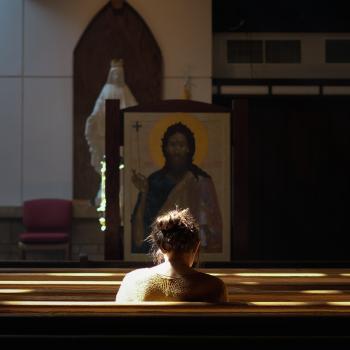So I’m here in Illinois, surrounded by cornfields and truck stops, in an oasis of leafy tranquility run by some kindly Franciscan nuns. (The picture above is a stunning window in a small prayer space called “The Canticle Room,” depicting St. Francis’s famous “Canticle of the Sun.”)
I’m preaching a retreat to deacon candidates about to receive the ministry of lector, and I’m struggling to put into words some thoughts on The Word, when along comes Elizabeth Duffy, who seemingly without effort has managed to say something wondrous on that very subject:
Only God requires no language from us, but he still used The Word, because he loves us, and needed to speak to our hearts in a way that could penetrate our sinful nature, our ego and our mistaken notions of what and who we believe God to be.
I picked up “The Cloud of Unknowing” recently, which I’ve tried to read several times before, even though the prologue of the book makes it clear that I am not the intended audience:
“Fleshly janglers, open praisers and blamers of themselves or of any other, tellers of trifles, ronners and tattlers of tales, and all manner of pinchers, cared I never that they saw this book.”
But I am feeling drawn towards less understanding of God and not more, or in other words, I wish to dwell in the mystery of God, to forget what I think I know, and allow God to surprise me.
“…struggle to pierce that darkness above you; and beat on that thick cloud of unknowing with a sharp dart of longing love, and do not give up, whatever happens.”
Practitioners of this type of contemplative prayer put out of their minds all language, all teaching, in the struggle to forget what they’ve been taught and dwell in the cloud of mystery. When thoughts arise of God’s attributes, human thoughts that might distract from the mystery, they are to be put out of mind by focusing only on one word, like “love” or “God.”
To strip language away, to dwell in what is essential and mysterious about another person, to see only what is divine or lovable in them, this too is prayer.
Yep, yep, yep. Read it all. I think a lot of us can benefit from this kind of thinking—especially in these fractured times.
The saint of peace, Francis, has much to teach us. I feel especially blessed to be spending time at this lovely place at this moment in my life on the brink of Pentecost. As happens so often, I sometimes get more from giving a retreat than I do from going on one.
Below is another window here at the retreat center, depicting “The Picnic of Francis and Claire.”












